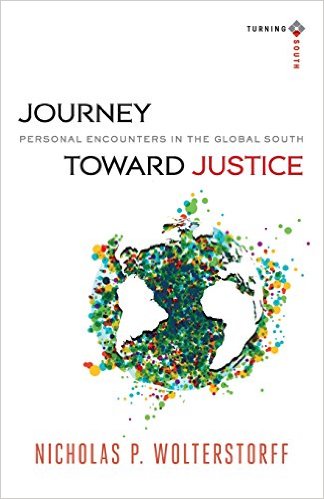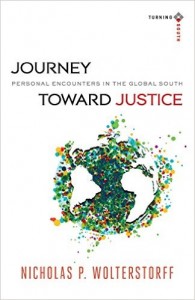reviewed by Gideon Strauss
Wolterstorff, Nicholas. Journey Toward Justice: Personal Encounters in the Global South. Grand Rapids: Baker Academic, 2013.
This review appeared first in the Spring 2014 issue of Comment magazine, a Cardus publication. <www.cardus.ca>. It is reprinted here with permission.
In September 1975, philosopher Nicholas Wolterstorff was sent by Calvin College, where he was teaching at the time, to participate in an academic conference at the University of Potchefstroom in South Africa. Unexpectedly, the conference, which had been convened for other purposes, became the occasion for a fierce conversation about South Africa’s apartheid—a political ideology and arrangement that allowed the country’s white minority to hijack its government to their own advantage in the provision of services and the administration of justice while oppressing and exploiting the majority of the country’s citizens. This was instituted under the guise of working toward a political order of racial and ethnic separation or apartness.
While the conversation was initiated by disagreements between the white Afrikaner academics hosting the conference and a number of their guests from the Netherlands, eventually the black South African academics present spoke up, “more in tones of hurt than of anger,” it seemed to Wolterstorff. They described the daily indignities heaped upon them and the many ways in which they were demeaned; they spoke of being expelled from their homes and herded off into Bantustans. With great passion, they cried out for justice. In this encounter, for the first time, Wolterstorff came face-to-face with those wronged by the injustices of apartheid. In and through their voices, he heard a call from God to speak up for the wronged, to stand alongside them as they spoke up for themselves.
My own experience has some similarities to that of Wolterstorff. As a young South African of privilege, my theoretical interest in justice turned into active participation in the anti-apartheid movement as a result of making friends with black South Africans of my own age, in the context of a Youth for Christ club (one of the very few nonracial Christian institutions in my birth city at that time), and my face-to-face encounter with these young men and women resulted in years of both activism and scholarship, including all of my graduate work, and a life trajectory with a particular (albeit circuitous) bent toward justice.
Gideon Strauss is a senior fellow with Cardus and the executive director of the Max De Pree Center for Leadership and a faculty member at Fuller Theological Seminary. A native of South Africa, he served as an interpreter for the country’s Truth and Reconciliation Commission under Archbishop Desmond Tutu.

